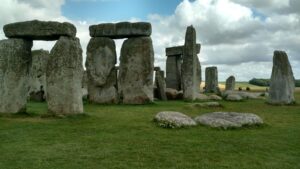
Stonehenge, UK, from a family trip in 2019 (closer to summer solstice than winter solstice, however)
0. TL;DR:
Most basically, I want people to be inclusive as possible, be specific when they know, be generic when they don’t, and mean what they say.
1. Generic vs. Specific Holidays
A. Generic: If you don’t know which holiday(s) someone celebrates in December, then courtesy calls for you to wish them “Happy holidays” so that they have the broadest possibility of being acknowledged.2
B. Specific: If you know what holiday(s) they celebrate, then go ahead and wish them wonderful celebrations by name. Whyever not? It’s a great feeling to be recognized.3
C. If you want to switch from 1A to 1B, you can ask!
2. Generic vs. Specific Celebrations

Welcoming and funny sign at the Office of Diversity, Equity, and Inclusion.
This is important even if you don’t know in advance that non-Christmas-celebrating people will be there. Just as in disability work, accommodation becomes inclusivity when it’s already in place. Saying “happy holidays” to strangers or decorating a common space with multiple winter holidays or calling a vacation “winter break” means that anyone who would have to decide whether to ask, “Does this mean me?” can instead feel already acknowledged.

Kwanzaa decoration at the COVID testing site on campus, 2022.
B. Specific: If you’re decorating your own space or hosting a party of your own, then please call it what you will, and celebrate as you want.
3. If you mean Christmas, please say Christmas!
This one kind of puzzles me. If you’re talking about Christmas, by all means call it Christmas! There’s no expectation that you use the word “holiday” instead, despite a growing popular belief to that effect: I’ve seen some people do this when trying to be cooperative, and some people who loudly refuse to do it, both without understanding that this is not the thing we’re asking for.
The people who claim there’s a war on Christmas apparently think they’re supposed to say “Happy holidays” instead of “Merry Christmas” even when they know people are Christian, and that they’re expected to replace all public uses of the word “Christmas” with the word “holiday”.
If that were true, then no wonder they get defensive!
No, not at all. I don’t want you to substitute “holiday” instead of “Christmas” as if it’s some sort of euphemism. Plot twist, I actually want you to say Christmas when you mean Christmas. I want you to talk about Christmas, and to make plans for Christmas, and, when it gets close enough, to sing songs about Christmas!5
I just don’t want you to only mean Christmas.
I particularly want you not to mean Christmas when you’re talking about me.
Even if you hide it.
Especially if you hide it.
4. A linguistic note: saying “the holiday” in December confuses me a lot.
There’s a weird fallout from the substitution game, some sort of derivation wherein “holidays” (inclusive) and “holiday party” (inclusive) somehow generate references to “the holiday” (weirdly specific).
Or maybe it’s already a thing Christians do, and it isn’t to do with these changes?
The problem isn’t that “holiday” is singular: When I hear “have a nice holiday,” that sounds fine. It’s the article “the”. “The” implies conversational agreement about what follows.
So when people ask me what I’m doing for or whether I’m ready for “the holiday,” I am genuinely baffled. Am I supposed to assume they mean my holiday? Do they assume it’s the same as their holiday? Why only one? Do they actually mean, in the British sense of “on holiday,” the set of holidays to follow, or the upcoming winter break?
Or … do they mean Christmas? 6
It’s disconcerting, because I never know, and I always feel compelled to ask for clarification so I can give an accurate answer, even though the speaker clearly thinks it’s unambiguous. And I always feel awkward asking, lest I come across as too suspicious, or too pedantic. It feels like breaking the fourth wall, or questioning a gift, by making something casual into a big deal.
I need to work on the casual ask.
5. Timing
I should mention that December greetings feel much easier to navigate for me in years such as this one, when the 25th of December is near the 25th of Kislev (the start of Chanukah), instead of later on. Somehow, in years where Chanukah arrives much earlier than Christmas, there seems to be a bigger surge of all-Christmas, all-the-time, with people who are challenged on it kind of annoyed, even weeks before Christmas, that we’d still want inclusion in December celebrations once Chanukah is already over.7

Celebrating together with friends when holidays coincide!
HOWEVER, in another exciting twist, I’m okay with you randomly wishing me a “Merry Christmas” on the day or evening it’s actually Christmas. I may even say it back! (Though this year I might say “Happy Chanukah” instead.) This is because I’m not upset that people want to wish everyone their favorite holiday greetings; I’m upset with the way it takes over the season: as majority holiday, Christmas demands and takes up SO MUCH mental energy for weeks and sometimes even months before it happens. You may think this is only true for Christians, but no, it affects just about everyone.
6. The Wrap-Up
Okay?
So to be clear:
I don’t want you to substitute “holiday(s)” when you actually mean “Christmas,” because that’s misleading.
I want you you to say “holiday(s)” without using it as a substitute for “Christmas”.
I want you to say “holidays” and mean more than Christmas and New Year’s.
I want you to say “holidays” and mean, instead, a big swirl of winter solstice-timed-or-related celebrations, including (and not limited to) Christmas and Chanukah and Kwanzaa and St. Lucia Day and New Year’s Eve and Solstice itself!
More holidays!
Winter Solstice (in the northern hemisphere), which I also call midwinter, is itself celebrated in many ways: for example, scientifically, as the astronomical moment of the sun “standing still,” or ritually, as the Pagan sabbat Yule. Other winter solstice celebrations include Toji in Japan, Dong Zhi in China, and Yaldā Night in Iran. (Note: Inti Raymi is a winter solstice celebration in the Andes, so it happens in June instead of December.)
I’m curious what celebrations happen around the December solstice in the southern hemisphere.
Other Christmas-related holidays include Las Posadas in Mexico, Ganna in Ethiopia, and St. Nicholas Day in Europe (which mystified me when I first read about it in Anne Frank’s diary; but…isn’t she Jewish…? And why December 6?) And St. Lucia Day. Also, the twelve days we hear so much about, concluding with Epiphany on January 6.
Then there’s Junkanoo, a Caribbean festival I learned about from a quiz presented in my kid’s social studies class. It’s apparently celebrated multiple times a year, including December 26.
From the same quiz I also learned about the Swedish Gävle Goat!
There’s the Buddhist holiday of Bodhi Day, or Day of Enlightenment, observed on the 8th day of the 12th month of the year. In the lunar calendar, this will be January 7, 2025, but in Japan, which uses the Gregorian calendar, it is celebrated consistently on December 8.
The Japanese New Year, or Shōgatsu, is thus celebrated on January first, with poetry and music (including Beethoven’s 9th!) and separate old year and new year parties.
Going farther into January (and often February), there’s the Lunar (technically lunisolar) New Year, which feels like a different season to me — and the Chinese students I’ve spoken to tend to talk about it separately from the solstice holidays. I think of it as more clustered with Brigid and Tu B’Shevat, as a turning point between winter and spring.
Reaching in the other direction, I always kind of want to include Diwali, because it’s a festival of lights itself … but since its range is October-November, it seems really far from the solstice for that. Opinions from those who celebrate?
And finally: happy holidays to all who celebrate! Wishing you well in both the comforting darkness and the returning of the light!
———
1 This supposed war is not new, or anything: I wrote a scathing letter to the Inquirer back in 1995 when they published an op-ed from someone who said, among other things, that the next person to wish her “happy holidays” would get punched in the nose. Oh! and she also said that Christmas parties used to be sweet and wholesome, and once they were called holiday parties, they became drunken and raucous.
2 It is, of course, possible that someone doesn’t celebrate any winter holidays at all, or that they don’t celebrate until, say, the lunar new year in late January or Early February. I’m not sure what is most appropriate here. Thoughts?
I still think it’s probably good to avoid exchanges like this one (though we worked it out):
Chinese undergraduate student to me: Merry Christmas!
Me, surprised, but willing: Oh! Merry Christmas!
We look at each other, nonplussed.
Me: …Do you celebrate Christmas?
Student: No.
Me: I don’t either.
Student: I thought all Americans celebrate Christmas!
Sigh.
3 I had an excellent illustration of this from an 11th grader when I was in 9th grade. Her family was hosting a party for the marching band in my very Christmassy town, and she was greeting people as they arrived. I heard her wish some people Merry Christmas and some people Happy Holidays, and I was relieved she was making that distinction. And then when it was my turn, she wished me Happy Chanukah. And I was astonished at how seen I felt.
4 Though I was at a holiday party this month where (I learned later) students said they wished Eid had been included. People who celebrate Muslim holidays, what is your take on this?
5 I’m actually fond of Christmas songs. When it’s actually Christmastime.
6 Okay, possibly they actually mean my holiday(s) and are laboring under the belief that I don’t want them to name holidays out loud. But how am I supposed to KNOW that?
7 I guess I should mention here the bit about how Chanukah is a minor holiday. I know a number of people who say they wish people didn’t make such a big deal about it, that’s it’s become some sort of Jewish version of Christmas. And in some respects this is true: the American celebrations of Chanukah are definitely outsized because of its proximity to Christmas.
But gifts and light have been part of the holiday for a very long time. In my case, I grew up thinking of Chanukah as an important holiday, with presents and candles and singing, and to me it was a Jewish thing-that-is-not-Christmas, rather than a Jewish version of Christmas. (For this reason, I have never understood the idea of a “Chanukah bush”.)
And as a grown-up, I think of all these northern winter holidays as a light-and-dark-filled recognition of the winter solstice, and I want to honor them. (See also my footnote to an earlier post about Chanukah’s darkness-and-light timing.)
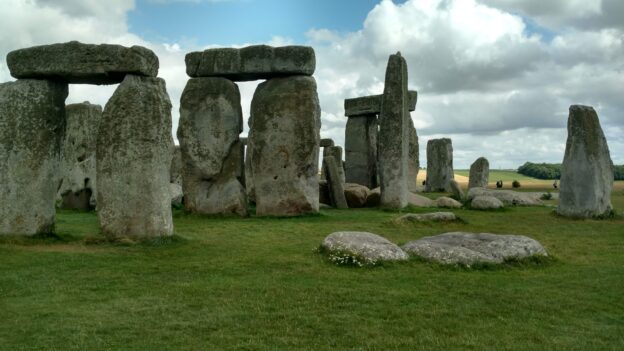
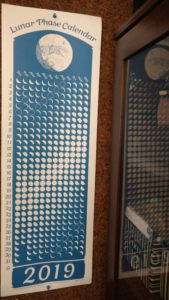 Today (in the northern hemisphere) we welcome the Vernal Equinox — a time of balance — along with the full moon that heralds the arrival of Purim.
Today (in the northern hemisphere) we welcome the Vernal Equinox — a time of balance — along with the full moon that heralds the arrival of Purim.
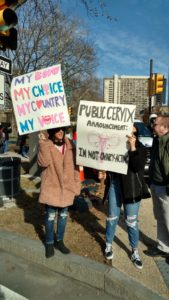
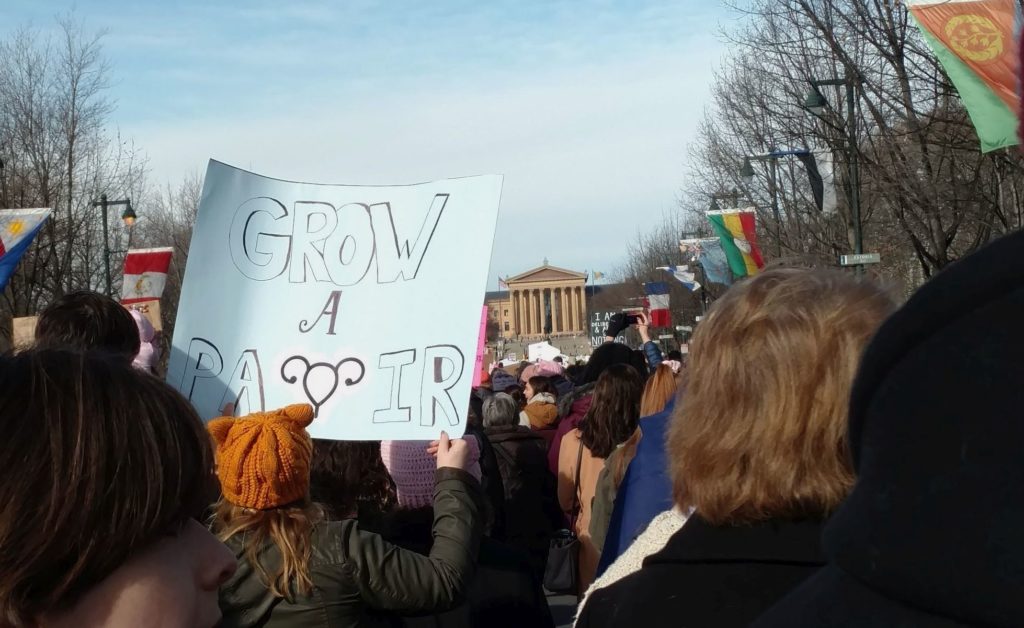
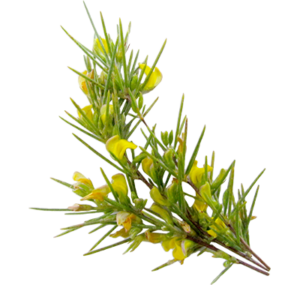
 In my medicine cabinet, alongside my regular toothbrush, I keep a special “end-tufted brush,” good for focusing gently on my gumline and the backs of my front teeth. I recently found myself looking at the packaging and finding that the name in French is “brosse à bout touffu”. Which is to say, “brush, at the end, tofu” – or…well, something like that.
In my medicine cabinet, alongside my regular toothbrush, I keep a special “end-tufted brush,” good for focusing gently on my gumline and the backs of my front teeth. I recently found myself looking at the packaging and finding that the name in French is “brosse à bout touffu”. Which is to say, “brush, at the end, tofu” – or…well, something like that.